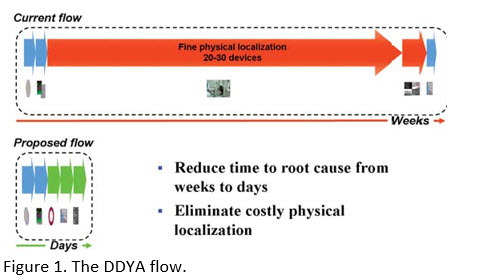What to Know about Today’s Scan Diagnosis and Yield Analysis Technologies
By Geir Eide, Mentor Graphics
What to know about today’s scan diagnosis and yield analysis technologies…
If you worry about semiconductor yield challenges you may already be armed with newer technologies like diagnosis-driven yield analysis (DDYA), which can rapidly identify the root cause of yield loss and effectively separate design- and process-oriented yield loss (Figure 1). The return-on-investment in DDYA can be great; for example, Freescale published a case study in which they improved mature yield by 1.5% in a few weeks by using DDYA technology on 1300 failing die.
Figure 1. The DDYA flow.
New advances in diagnosis analysis technology make DDYA more valuable than ever before. If you haven’t kept up with the technical literature or learned all about the range of products available, download this free technical paper for a great overview of state-of-the-art scan diagnosis and yield analysis technologies.
The paper was presented as a tutorial at the 2015 IEEE European Test Symposium by Mentor scientists. In it, the authors survey the recent advancements in DDYA, including application of different fault models and the related technologies that improve diagnosis accuracy and performance.
Scan diagnosis technologies include diagnosing failures in the scan chain, performing layout-aware logic diagnosis, diagnosing failures after test data compaction, and diagnosing other fault types (transition, hold-time, Iddq, compound defect, etc.) with Cell-aware diagnosis.
The paper also presents some DDYA best practices based on industrial experiences, and describes two sophisticated statistical techniques that greatly improve failure analysis (Figure 2), zonal analysis and root-cause decovolution.
Figure 2. Zonal analysis
Several case studies are detailed that cover an array of DDYA application spaces:
· Volume diagnosis yield analysis for ramp-up based on zonal analysis
· DDYA for mature yield improvement
· Using root-cause decovolution to enhance diagnosis resolution
· Critical feature identification






